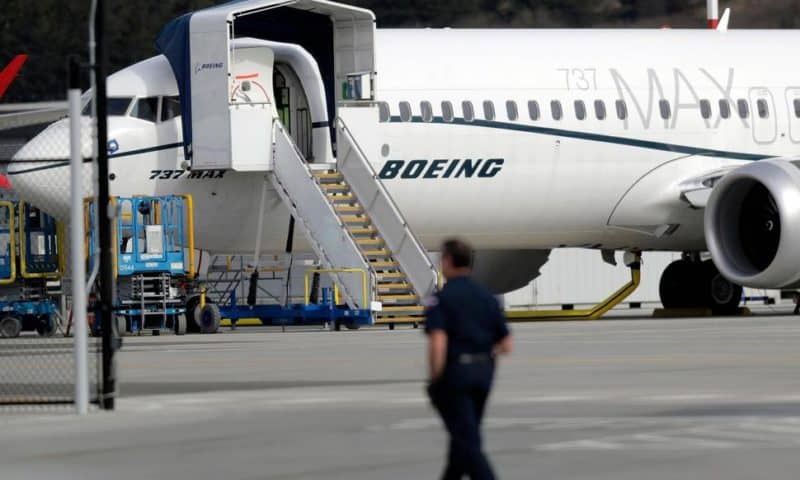Boeing’s newest version of its best-selling airliner has crashed twice in less than six months, delivering a massive blow to the company’s reputation.
NEW YORK — In an era of unprecedented airline safety, Boeing’s newest version of its best-selling airliner has crashed twice in less than six months, killing 346 people and delivering a massive blow to the company’s reputation.
More than 40 countries either grounded the planes or refused to let them into their airspace after determining that Sunday’s crash of a 737 Max 8 in Ethiopia bore enough similarities to Indonesia’s Lion Air crash of the same model in October. After holding out for several days, the U.S. Federal Aviation Administration issued an emergency order grounding the planes.
Boeing’s reputation is damaged not only because of the crashes, but also its decision not to voluntarily ground the planes itself as country after country pulled them from the sky.
The company’s finances will take a hit as it faces lawsuits from victims’ families, compensation claims from airlines, delayed revenue from missed plane deliveries and the expense of figuring out what went wrong and then fixing its planes.
But the airline industry has a long history of recovering from tragedy, and experts say the disaster is unlikely to have a lasting impact on Boeing’s brand or finances.
John McDonald, founder of crisis management firm Caeli Communications, was a former flight attendant in charge of communications for TWA when an airliner — also a Boeing — exploded and crashed into the Atlantic Ocean off Long Island in 1996. McDonald lost colleagues in that crash, which killed 230 people.
“If you look at past history of when they’ve had any issues with aircraft, they fix the problem and they move on,” McDonald said. “It’s very, very traumatic, but aviation safety is built on the blood of victims, and that’s how you learn these lessons. The real challenge is to make sure you understand what the problem is before you start putting in fixes.”
The groundings will have a far-reaching financial impact on Boeing, at least in the short term. There are more than 4,600 Boeing 737 Max 8 planes on backlog, and they won’t be delivered until Boeing has fixed any problems and the ban is lifted.
Boeing paused deliveries of the 737 Max, but continues to build the airplanes, said company spokesman Charles Bickers. It is assessing how the situation, including potential capacity constraints such as where to park the planes while they wait to be delivered, will impact its production system.
Boeing shares were down more than 11 percent this week through Thursday, and had lost about $29 billion in market value. The shares still have outpaced the market in 2019.
In grounding the planes in the U.S., President Donald Trump on Wednesday said the decision “didn’t have to be made, but we thought it was the right decision.”
“Boeing is an incredible company,” Trump said. “They are working very, very hard right now and hopefully they’ll quickly come up with an answer.”
Boeing says it recommended to the FAA to temporarily suspend operations of the entire global fleet out of an abundance of caution and to reassure the public of the aircraft’s safety.
In an internal memo, Boeing CEO Dennis Muilenburg told employees he understands “this is difficult for our teams, especially all those who directly support the 737 program,” but added, “we continue to have full confidence in the safety of the 737 MAX and our teams who design, build and support it. This decision doesn’t change that.”
Some analysts say airline customers are unlikely to cancel orders of the plane, which are long-term agreements that can take a decade to fulfill, because those financial agreements are already in place and, other than Airbus, there aren’t competitors offering an alternative to the Boeing 737 Max.
“The bigger and more reputational issue for them is, how do you sell more of those planes in the future?” said Paul Argenti, professor of corporate communications at Dartmouth’s Tuck School of Business. “The Lion Air crash puts in motion that something’s wrong, what are we going to do about it, and by the time the Ethiopian plane goes down, it should have been resolved.”
Norwegian Air’s CEO says he will seek compensation from Boeing for the disruption caused by the groundings, and other airlines may follow suit. Whether airlines would be successful with such claims depends on the details of the contracts those carriers have with Boeing, said Dan Rose, partner at Kreindler & Kreindler, an aviation law firm that has represented victims’ families in other crashes.
Southwest has a long history with the 737 and the airliner has a stellar safety record, the airline’s CEO Gary Kelly said Thursday. He said the company’s history with the Max has been phenomenal, and nothing has presented any flight concerns.
While countries around the world grounded the Max 8 ahead of the U.S., some fliers frantically tried to figure out whether they were going to be flying on a Max 8, and if so, how they could switch.
It was Boeing’s job to restore confidence among travelers but by waiting for others to ground the planes, it created the perception that it wasn’t putting the passengers’ safety first, said Joshua Kroon, vice president of Levick Strategic Communications, a crisis communications firm.
“The natural conclusion is they only care about making money, they don’t care about my safety,” Kroon said.

